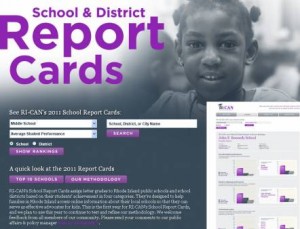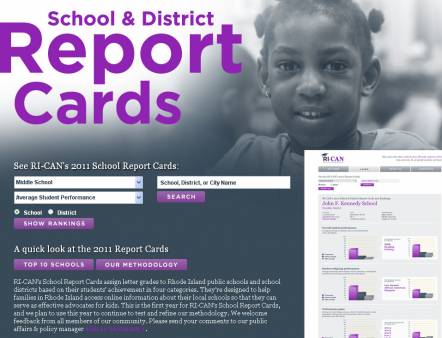 Not everyone is thrilled with RI-CAN’s new report cards on Rhode Island public schools. Most notably, The Learning Community, a Central Falls charter school that serves students from there, Providence and Pawtucket.
Not everyone is thrilled with RI-CAN’s new report cards on Rhode Island public schools. Most notably, The Learning Community, a Central Falls charter school that serves students from there, Providence and Pawtucket.
“RI-CAN talks about putting kids and parents first, but their report card system seems to be primarily a public relations tool, not a source for accurate school data,” according to a response issued by the charter school to the report cards. “RI-CAN’s system undermines the school performance measures proposed by the Rhode Island Department of Education, and discredits the tremendous effort that Rhode Island students, teachers and administrators are devoting to improving student achievement based on accurate information.”
Kath Connelly, declined to elaborate on their analysis, but did give us permission to reprint their response:
One School’s Views on the RI-CAN Report Card System
As advocates for public education, The Learning Community has grave concerns about the RI-CAN school report cards that evaluate every Rhode Island public school based on faulty methodology. RI-CAN claims that their report cards “are designed to help families in Rhode Island access online information about their local schools” when in truth the report cards spread misinformation to concerned citizens. Instead of providing access to accurate data, RI-CAN summarizes a school’s performance by using only one grade level’s achievement on state standardized tests and mathematically incorrect calculations.
No efforts at holding schools accountable will succeed unless the measures used are fair and accurate. It is worth mentioning that we are expressing our strong opposition to the report cards despite the fact that The Learning Community ranked in the Top 10 schools in Rhode Island on 7 of the 14 indicators.
The methodological deficiencies of the RI-CAN report cards render them at best useless and, at worst, harmful to our state’s efforts to support the education of every child.
- Every school’s “overall student performance” score is really based on the scores of only one grade level. For example, RI-CAN’s measure for an elementary school is based on the performance of the 5th grade only. This means that the scores of 40 students might represent a school where 300 students were actually tested. Investors would not judge the success of a business on one quarter of financial data. (Three of RI-CAN’s four report card scores are based on the performance of only one grade level.)
- RI-CAN’s approach to measuring school performance is dated and has been discredited nationally as too narrow. RI-CAN’s report cards rely solely on state standardized test data and do nothing to portray the context of each of our state’s schools—even though these data are readily available through the state’s nationally recognized Information Works! system. Recognizing that excellent schools involve more than just a single test score, report card systems in Washington, DC, and New York City, while controversial, at least included a range of data points to evaluate schools.
- RI-CAN misuses basic math. RI-CAN’s “student subgroup performance,” “achievement gap,” and “performance gains” measures rely on combining the performance of multiple groups of students into a single score. Instead of doing the basic math to determine an accurate score, RI-CAN took a short cut and averaged a series of averages into a composite score. Consider the following example:
Low-Income Students Black Students Hispanic Students
Number Tested
20 10 40
Proficiency Rate
50 75 25RI-CAN’s report card simply averages the average proficiency rate of the groups above, for a “student subgroup performance” score of 50% (= (50+75+25)/3). Basic mathematics, however, requires us to weight the scores based on the number of students in each group, resulting in a score of 39% (= (20/70)x50 + (10/70)x75 + (40/70)x25). If 5 students scored 100%, and 50 students scored 15%, the size of those groups makes a big difference.
- RI-CAN ranks schools on faulty numbers. When researchers release data, they identify a margin of error. NECAP data includes these ranges, to let us know that a school that scored a 54 might actually be within the same range as a school that scored a 52. RI-CAN, however, chose to rank schools based on a single number—identifying distinctions even when there is no statistically significant difference between the schools’ performance. (In the performance of subgroups, which have even smaller numbers of students, the lack of a margin of error is even more distressing.)
- The RI-CAN system is unfair to urban schools. Because the RI-CAN report cards are based on a single grade level, schools with few students in that grade who are low-income or Black or Hispanic will not have a score for those subgroups. Many suburban schools are not given any score for “student subgroup performance,” whereas every urban school is. By contrast, the RI Department of Education, recognizing the unfairness of this approach, is preparing to hold nearly all schools accountable for subgroup performance.
We are also distressed that at a time of limited public resources, RI-CAN has chosen to create its own faulty system instead of working collaboratively with the state and other education advocates to get the real data about the real challenges and successes in our communities in the hands of citizens.
So what can you do to get more useful and accurate information about the public schools in your neighborhood? Here are few sources that are more reliable:
1. Visit InformationWorks! which includes a range of data on every public school in Rhode Island. http://infoworks.ride.ri.gov/
2. Read the complete NECAP scores for the schools you care about. More information here: http://www.ride.ri.gov/Assessment/Results.aspx.
3. Visit the schools in your neighborhood. No score can capture the spirit of a school or the kindness of a teacher. Ask at your local school what you can do to learn more or how you can help.If you are curious about the RI-CAN system but do not want to sign up to “be a member of RI-CAN,” feel free to log on as:
Username: thesetwohands Password: thesetwohandsRI-CAN talks about putting kids and parents first, but their report card system seems to be primarily a public relations tool, not a source for accurate school data. RI-CAN’s system undermines the school performance measures proposed by the Rhode Island Department of Education, and discredits the tremendous effort that Rhode Island students, teachers and administrators are devoting to improving student achievement based on accurate information.


Deprecated: Function get_magic_quotes_gpc() is deprecated in /hermes/bosnacweb08/bosnacweb08bf/b1577/ipg.rifuturecom/RIFutureNew/wp-includes/formatting.php on line 4387
Deprecated: Function get_magic_quotes_gpc() is deprecated in /hermes/bosnacweb08/bosnacweb08bf/b1577/ipg.rifuturecom/RIFutureNew/wp-includes/formatting.php on line 4387
Deprecated: Function get_magic_quotes_gpc() is deprecated in /hermes/bosnacweb08/bosnacweb08bf/b1577/ipg.rifuturecom/RIFutureNew/wp-includes/formatting.php on line 4387